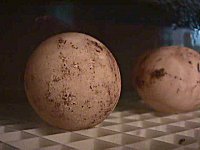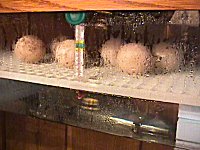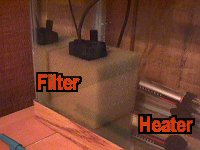Hatching Geochelone Denticulata (S.A. Yellowfoot Tortoise)

 This is a pan-shot of the 15 gallon aquarium I modified into an incubator. A thermometer over the water bath shows 82-87 degrees. The eggs are on fluorrescent “egg crate” about two and a half inches above the water’s surface. The water bath is 90 degrees. The airspace the eggs are in is 82-87 degrees.
This is a pan-shot of the 15 gallon aquarium I modified into an incubator. A thermometer over the water bath shows 82-87 degrees. The eggs are on fluorrescent “egg crate” about two and a half inches above the water’s surface. The water bath is 90 degrees. The airspace the eggs are in is 82-87 degrees.
 The top of the incubator is a piece of insulating sheathing. I figured since it is fish safe, it is also probably tortoise safe. There are two gaps in the top which I could adjust to have more humidity, more heat, or less of either.
The top of the incubator is a piece of insulating sheathing. I figured since it is fish safe, it is also probably tortoise safe. There are two gaps in the top which I could adjust to have more humidity, more heat, or less of either.
 The filter is a simple sponge filter powered by a 600/L/Hr pump. I used this very same type of system to keep some Sulcata hatchlings warm last winter and it worked great, but the water fouls if not filtered. The heater is reliable and runs the water at 90-92 giving me a 82-88 degree airspace.
The filter is a simple sponge filter powered by a 600/L/Hr pump. I used this very same type of system to keep some Sulcata hatchlings warm last winter and it worked great, but the water fouls if not filtered. The heater is reliable and runs the water at 90-92 giving me a 82-88 degree airspace.
 Now, here is my point of worry, and I need your advice. There’s water condensing on the sides of the airspace. This would suggest almost 100% humidity. However, the eggs (since they are inside and isothermic with the air around them) have no condensation on them at all. Given the high humidty, will they still dehydrate? No forced air is used. –> (The eggs hatched fine with the condensation on the glass)
Now, here is my point of worry, and I need your advice. There’s water condensing on the sides of the airspace. This would suggest almost 100% humidity. However, the eggs (since they are inside and isothermic with the air around them) have no condensation on them at all. Given the high humidty, will they still dehydrate? No forced air is used. –> (The eggs hatched fine with the condensation on the glass)

 Detail of two of the six eggs I got 9/7/98 midnight. They were laid by the female in sphagnum peat moss which was bone dry, but I found them AS THEY WERE LAID. I took them out of the nest so they would not get broken. They are very large. I rinsed them by running them under poured, distilled water. They were never submerged or sprayed under pressure.
Detail of two of the six eggs I got 9/7/98 midnight. They were laid by the female in sphagnum peat moss which was bone dry, but I found them AS THEY WERE LAID. I took them out of the nest so they would not get broken. They are very large. I rinsed them by running them under poured, distilled water. They were never submerged or sprayed under pressure.
The tops of the eggs are marked with X’s in plain pencil and they are stable and will not be turned.
Questions:
* Should I spray them daily with distilled water?
(I did)
* Do they (as with some snake eggs) need to be kept in the dark, or is lamp light okay to monitor them by?
(Mine were kept in indirect lamp light from the room)
* Will the tanks’ humidity avoid dehydration or should they be on a papertowel to hold moisture? How moist is “too moist” which causes rot?
(These eggs were on egg-crate and not on any porous surface)
* Does anyone know the true incubation period (variables notwithstanding) of the Yellowfoot tortoise?








